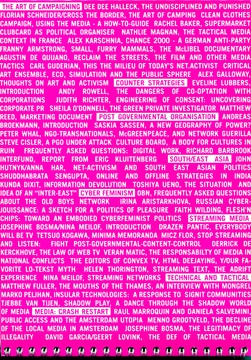Search results for 'tactical+media'
A Virtual World is Possible: From Tactical Media to Digital Multitudes
I.
We start with the current strategy debates of the so-called 'anti-globalisation movement', the biggest emerging political force for decades. In Part II we will look into strategies of critical new media culture in the post-speculative phase after dotcommania. Four phases of the global movement are becoming visible, all of which have distinct political, artistic and aesthetic qualities.
Tactical Media in Brazil - Submidialogia conference report
The four-day conference on the campus of the Universidade Estadual de
Campinas (Unicamp) brought together many key persons from the tactical
media movement of Brazil and some of their counterparts in the
Brasilian government.
The movement is converging from roots in
free radio, free software, hardware hacking, art and social movements.
It is currently focussed around a large-scale project master-minded by
Claudio Prado and supported by the Ministry of Culture: ?Pontos de
Cultura? (Culture Spots) which is aiming to empower up to 600 cultural
projects with free software-based multimedia production and publication
facilities.
Conference Report ‘The Society of Post-Control’
Summary of the extended conversation on the emergence, consequences, and activist responses to the concept of "post-control"
Report of the conference 'The Society of Post-Control', organised by Eric Kluitenberg and David Garcia, tying into the opening of the exhibition As If.
Tactical Television in Italy
Overview and manifesto of urban tv movements in Italy
Security through InSecurity
Increase the level of paranoia.....
bombs in the metro.....bombs in Oklahoma......
bombs in the World Trade Center.....bombs in Mururoa.....
Who are the real terrorists?
Hippy Cull
from Underground, PO Box 3285, London, SW2 3NN, UK
1. Neo-hippyism is upon us: a bumper pack of seriously dumb tendenciesthat cripple processes of change. Some of these tendencies relate toideas, and some of them to action, they range from the 'political' tothe way people dress. They form the aesthetic, theoretical and materialdatabases people use to inform and develop what they are getting up to.This database needs reformatting.
Cybernetics & Entheogenics
Abstract of the lecture by Peter Lamborn Wilson
For the 'Next Five Minutes" Conference, Amsterdam, january 1996
The Disappearance of Public Space on the Net
The Internet was started in the 1970's by the U.S. Defense Departmentas a communications tool and is now being bought out by I.B.M., M.C.I.and other megaCorporations. April, 1995 marked the closing of theNational Science Foundation's part of the internet, and signaled thebeginning of the end of the publicly funded computer networkinfrastructure.
Constructing the Digital Commons
March 2003
Democracy can be understood in two notably distinct ways. In the institutional view democracy is understood as the interplay of institutional actors that represent 'the people' and are held accountable through the plebiscite; public votes, polls and occasionally referenda. The second view on democracy is radically different in that it sees the extent to which people can freely assemble, discuss and share ideas about vital social issues, organise themselves around these issues, and can freely voice their opinions in public fora, as a measure for just how democratic a given society is.
Unser Feind, das Internet
- Ethische NETZPRINZIPIEN
Impulsreferate etablieren eine engagierte RL Diskussion, die Im Netz fortgefuehrt und in Newsgroups konkretisiert wird.
Der Wunsch und die Notwendigkeit zur Entwicklung neuer Terminologien
und originaerer Diskurse wurde evident. Nach den Jahren des Zitierens
ist es an der Zeit und wird durch neue Lebensrealitaeten im
elektronischen Netzwerk und aufgrund internationaler Erfahrungen mit
der Praxis regulativer Eingriffe neue Begriffe, Strukturen und Theorien
zu entwickeln. Jeder kann sich aktiv an dieser Koevolution technischer
und Inhaltlicher Verbindungen beteiligen!
Dawn of the Organised Networks
At first glance the concept of "organised networks" appears oxymoronic. In technical terms, all networks are organised. There are founders, administrators, moderators and active members who all take up roles. Think also back to the early work on cybernetics and the "second order" cybernetics of Bateson and others. Networks consist of mobile relations whose arrangement at any particular time is shaped by the "constitutive outside" of feedback or noise.[1] The order of networks is made up of a continuum of relations governed by interests, passions, affects and pragmatic necessities of different actors. The network of relations is never static, but this is not to be mistaken for some kind of perpetual fluidity. Ephemerality is not a condition to celebrate for those wishing to function as political agents.
ReadA Personal Map of the Resistance Movement in France
For many reasons, the 80's, years of the Mitterand socialist government, were years in which grass roots movements got institutionalized and traditional activism was "out". The logic of the Republic (everybody is equal without distinction) allied with traditional individualism and clanic behaviour ("la guerre des chapelles") forbid the emergence of non dominant/non normalized subjectivities. This tradition is still alive today. The 68 generation didn't feel necessary to pass on their knowledge to younger generations. From their point of view, they created new ways to go about the world by themselves, so should the new generations. The notion of alternative and activism became stigmatized. It wasn't a very tactical in those years to position oneself in terms of an alternative. As a result, by the beginning of the 90, the most visible part of the intellectuals and the grass roots movements seams to be lobotomized.
ReadVectorial Empires
01. These are precarious times. These are eventful times. Let us note some of the symptoms of this instability. There is September 11,and the prospect of a new form of American empire that uses September11 as its pretext. There is the global stock market slide, triggered by the collapse of American tech stocks, which altered the lives of chip-makers in Korea and Coltan miners in the Congo. These are instances of what I call weird global media events. They are events because they are singular. They are media events because they happen in a vectoral space of communication. They are global media events because they call a world into being. They are weird global media events because they defy explanation. They subsume every explanation as mere ripples and eddies in their wake.
ReadIntroduction Sarai Reader 04: Crisis / Media
"The darkest, hottest place in hell waits for that repulsive angel choir
Which, at the hour when crisis strikes, sings equivocal, neutral songs".
Dante, Inferno, Canto III.
Escaping Assad and Revolution in Rojava
An interview with a Syrian activist in exile, code-named Sami, published by Occupy.com draws attenton once more to the radical experiment in real-life bottom-up matriarchal democratic design unfolding against all odds in the autonomous Kurdish region of Rojava in Northern Syria. We are republishing two short texts here on this subject matter to speculate about the question if 'Rojava' could offer a repeatable model for post-governmental political design?
Finissage Really? Art and Knowledge in Time of Crisis - 29 September 2024
On Sunday September 29 the exhibition Really? Art and Knowledge in Time of Crisis concludes with a series of interlocked conversations that explore how artists address the erosion of trust in knowledge and the rise of disinformation, through their investigative and critical practices.
Sunday September 29, 10.00 - 16.00
Framer Framed, Amsterdam
Hybrid off/online performance UKRAiNATV, 17.00 - 18.00



